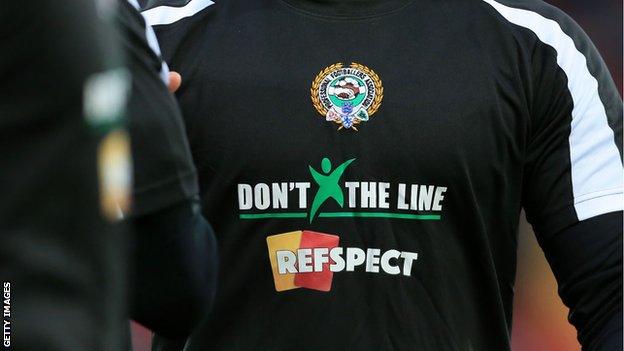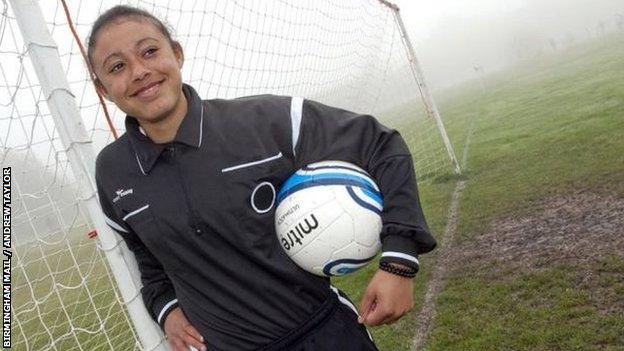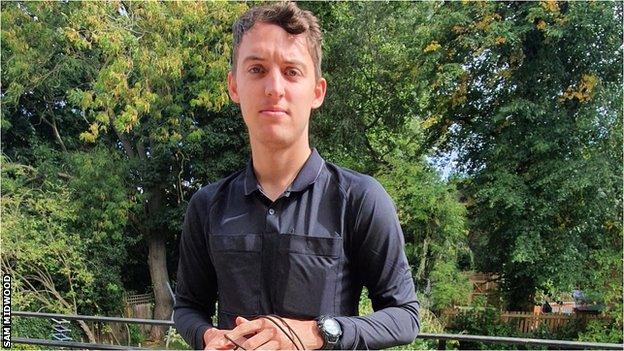Refereeing and abuse: 'Why I love being a referee and won't quit'
- Published

A 2019 campaign in professional football saw referees wearing anti-abuse t-shirts before matches
From a youth league cancelling a round of fixtures and an under-7s club being banned, to plans for bodycams to be introduced in adults football, the topic of referee abuse in grassroots football has been on everyone's lips this week.
It's one which thousands of BBC Radio 5 live listeners and BBC Sport website users have engaged with, getting in touch to share your experiences as referees or as the parents of young officials in the game.
Some of your tales have been harrowing - stories of being attacked, threatened, physically and verbally assaulted and spat on. Some of you have quit, others are persevering, determined to push for change.
Here are three stories from those in the middle of the park.

Andrew Taylor, 52, and his daughter Abbie, 29, are both referees in Birmingham. They have been officiating for more than a decade. Andrew spoke to BBC Sport.
My experiences have ranged from the good to the ridiculous. I've been threatened with shootings, I've been offered out numerous times, I've been told that had I been in another country I would have been shot already or stabbed or murdered. These are after local games with what I would deem respectable sides, but things have just got out hand.
We both referee men's and women's games but we've stopped doing kids' games because of the parents. The kids themselves are great, but it's the parents on the side who are trying to live their failed dreams through their children.
I don't know if it's got worse, but it's highlighted more now.
People have always disagreed with referee's decisions, it's very opinionated, but these things are highlighted more because there is more coverage on TV. Everyone relates everything to what they've seen on TV. You'll always get a player turn around and say "that happened in the Spurs game last night and that wasn't a foul or they didn't give handball so why have you?".
I'm a big lad, I can look after myself, I used to be a doorman. Until my legs can't carry me, I will stay in the game as a referee. No matter what level of violence I'm faced with, I don't think they will ever force me out.
The FA are talking about us having bodycams, I think it will help, it will deter some people - though others will probably play up to the camera.
I think matters could be improved at grassroots level if top level referees enforced the law properly and perhaps gave red cards to players and coaches for foul and abusive language, as is the law.
If top level players were to suffer this more often, perhaps it would travel down the levels and players would change their approach and attitudes towards referees.

Abbie Taylor - pictured here in 2012 as a 19-year-old - started out in the Solihull & District Oakbourne league
Me and Abbie referee in the same leagues and so a lot of people know that she's my daughter, so they start off by giving her some respect but she's more than capable of looking after herself.
Do I fear her being out there? No, she knows how to handle situations. Does it upset her? I think it did in her younger days, but she's become hardened to it now. She's learned how to deal with it.
She's definitely treated differently because she's female, she's said that herself. Teams say things around her that are sexist but she handles that quite well from what I've seen, and you get some players who don't swear in front of her, or try not to, because she's a woman. As a man, I face more physical threats than her.
On the occasion I was threatened with shooting, I reported it to the league and the FA and to this day I don't know what the punishment was.
I know of referees who have been attacked and no longer referee. It sends out all the wrong signals and I think a lot of referees feel they're not been supported.
I will never let them beat me and Abbie's the same, we will never be beaten.

Sam Midwood, 27, is a grassroots referee in leagues across London. He qualified 10 years ago and has previously refereed in Edinburgh, Newcastle and New Zealand.

Sam Midwood
It's in the most recent years that I've experienced the difficulty and abuse. To begin with, I hadn't seen much of it but it's been more prevalent in the last five years.
There was a men's game on a Sunday, families and kids watching, and I issued a yellow card. One of the players comes storming up to me and said "stop making this game about you" with a lot of expletives. I was 25 at the time, he was right in my face and then other players start coming towards me. When a player has been aggressive, after the game they shake your hand as if nothing has happened, they don't apologise for it.
I've been very under the cosh and felt pressured, during the drives home after a game I've felt very anxious and stressed but I keep pushing on because I love doing it and I want to help it improve.
It's jarred me and it's made me more determined to stamp it out.
At school, I experienced some bullying and I think that has grown into my refereeing - if you back down, it only lets them win.
I changed my strategy. Before each game, I now speak with the players and tell them 'I am here to referee, you are here to play' and anything untoward I with deal with seriously. That seems to have improved it for me.
I've got two younger brothers who are 10 and eight, and play football at the weekends. I think it's at that level where you should introduce respect for the referee because once a person hits their thirties or forties they're set, they're not going to change their approach no matter how much you try.
I think the professional game is partly to blame too. They see players crowding the referee and yes they get their fines and their bans, but once a child sees the referee surrounded, that's stuck in their mind.
I really enjoy the community of football, it brings together people from all walks of life. The reason I throw myself into it is because in social situations I'm maybe more anxious than normal but on the pitch, I've got no choice. I've got no friends to back me up, it's me against 22 angry men.
Over my 10 years, I've got a thicker skin from it and I've gone on to be able to improve my own life from it.

Trevor Mitchell, 72, was a semi-professional referee for nearly 40 years. Now retired, he mentors young referees in and around Peterborough.
People know me because I've been around the circuit, so if a young referee has a problem at a match, then the league ring me up and ask me if I will go and speak to the referee and get what I can out of him, find out what happened, and be there for him.
I went to one a couple of weeks ago which I thought was disgraceful. The referee was 16, it was an under-8s match, and the person in question had already served a 180-day ban.
He came across to the referee to shake his hand, but wouldn't let go and was saying "you're on video, I've been videoing you", which he's not allowed to do anyway. The referee stopped the game and then re-started it, but then the parents were all telling him "you don't know what you're doing".
I never faced that when I was refereeing, and so the league called me and asked me to go speak to the young lad and put an arm around his shoulder to boost his confidence back up.
When I was a referee, you had trouble in men's games but your reputation went before you. They knew how they stood with me and I knew how I would react to them.
When I used to do youth football, it was never like it is today. It's awful, a hundred times worse.
The last lad I saw, I think it was his fourth or fifth game. It's no wonder young lads don't want to referee anymore, because if they come up against that after two or three games, they're never going to get their self-confidence back.
There's too much football on the television now. The way the professional players get away with lots of things that go on, the coaches are animated running up and down the touchline questioning referees, fourth officials, VAR.
I think there's football on every night of the week and if lads are at home watching their team, and their team's manager is running up and down the touchline disputing decisions, it stems from there and it's coming down to grassroots or semi-professional football. To me, that's where the fault lies, with the professional game.
Truthfully, if it's youth football and it's got really bad, I would want them banning for at least five years - 180 days is nothing, but to ban them from football for five years would teach them a lesson.